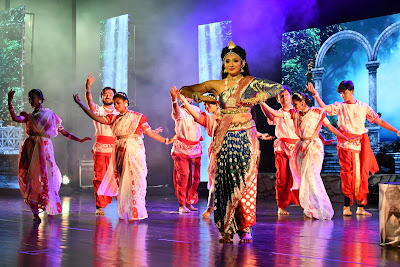Mythological dance dramas are getting very popular in India, and one such dance drama that is making waves all over India is Chitrangada – Ek Sashakt Naari, written by the pillar of Indian Literature Guru Rabindra Nath Tagore and directed and choreographed by Madhumita Chakraborty and Tony Chakraborty.
For over three decades, Madhumita and Tony have dedicated themselves to the pursuit of excellence in dance, specializing in classical and folk forms. Their profound expertise in various creative styles has earned them acclaim as choreographers and winner of dance reality shows. Madhumita is a self-made woman, who epitomizes the spirit of determination and achievement along with Tony her backbone and strength. Their commitment to preserving and promoting the rich heritage of Indian dance forms has garnered widespread admiration and respect within the cultural community. Madhumita has also been honoured with Maharashtra Gaurav Award, and the WOW Excellence Award in choreography.
This ground breaking production as directors marks the first-ever presentation of Chitrangada in Hindi, promising a delightful fusion of music, dance, and storytelling vision for this musical extravaganza transcends boundaries, as Madhumita and Tony aim to showcase the essence of Tagore's work to audiences both nationally and internationally. Founder of Nritya Vishakha Institute for the past 30 years they along with their pupils opened ‘Chitrangada Ek Sashakt Naari’ in Mumbai recent with house full show and are now touring the country, I caught up with the debutant director duo who are overwhelmed with the response of the show, excerpts from the interview;
Why did you choose the story of Chitrangada as your directional debut?
I chose the story of Chitrangada as my directional debut because I could connect with the courage, power, challenge in her as a woman with my strength as a woman. Chitrangada, is not merely a simple tale of love; it stands as a unique narrative of women's empowerment and individuality. This dance drama portrays a story of feminine power through Indian dance. As a debut director my primary creative force behind the production was its unique vision and communicate that vision effectively. The script of Poetic Drama version attracted me for the eternal message to eliminate the discrimination between man and women and also the expected honourable coexistence of them together.
What is the story of Chitragada?
We believe history seems to have forgotten Chitrangada, that is why we chose to do this story. It is a coming-of-age story of a warrior princess who falls in love with the Pandava, Arjun. How on a journey of self discovery and courage she empowers herself and find love in Arjun. Through this production, we offer our viewers a 90-minute-long, entertaining, and engaging performance that brings together five different dance forms, three types of classical music, and an epic retelling of Tagore’s story. Our production is not just a performance but a celebration of our rich cultural heritage and the timeless themes of love, honor, and self-discovery. By presenting Chitrangada, we aim to rekindle the audience's appreciation for classical art forms and showcase the strength and resilience of womanhood. This story of a warrior princess speaks volumes about empowerment, making it highly relevant and inspirational in today's context.
Your cast and crew is huge and a lot has gone into preparing for it I am sure?
Oh yes! there are a list of people we have to thank for this show. My two lovely Chitrangadas; Actress Suhasi Dhami who plays the role of Surupa Chirtangada and Moumita Pal who sashes the role of Kurupa Chitrangada, Sandip Soparrkar as Arjun. The music director is Santanu Bhattacharya, music arrangement by Abani Mohan Biswas. Singers are Ujjal Mukherjee, Soma Chakraborty, Tony chabraborty, Mamali Ghosh and Sharmistha Ghosh. Voice over by Kulraj Bedi, Jigna Bhardwaj, Amit Dolawat.
Madhumita, you are a trained artist, tell me about your dance training and background?
I have been trained to dance from the age of 8 years. As I have been brought up in Kolkata which is the city of art and culture, I had the best teachers, first I started training myself with classical forms Kathak and Bharatanatyam, then I also got trained in Rabindra Nritya. But I could not carry forward my Bharatnatyam but continued with my Kathak training. Later I also got into the choreographing folk dance. I found every style of dance very authentic and every dance has its own beauty. When I moved to Mumbai I trained in Latin, Jazz and Ballroom too. I am a student of dance and till today I have the hunger for it.
Madhumita, how has Rabindranath Tagore’s work influenced your life?
Tagore's advocacy for women's rights was not limited to his writings. He actively promoted women's participation in social and political movements. He encouraged women to organize themselves and fight for their rights. Guruji’s contributions to women's empowerment were wide-ranging and multi-faceted.
Labonno.
The female lead of Tagore's 10th novel Shesher Kabita, Labonno is portrayed as a progressive mind who has the strength to take the decisions of her own life, despite her social context. She is a symbol of feminism who thought of an independent life. In the 1920s, women were evaluated as objects rather than humans. At that time, Labonno's personality, pride, and knowledge were like a breath of fresh air in Amit's life. Labonno's personality, confidence and self-respect made the character iconic. She became a symbol of feminism, and women empowerment. I could very well relate my life as a woman with Labonno, I could understand the prospective the perseverance and the boldness which I am carrying and made me what I am today. With the stories of Tagore I could feel the strength as a woman, and my fight as a woman with lots of courage. The stories of Tagore inspire me thoroughly.




